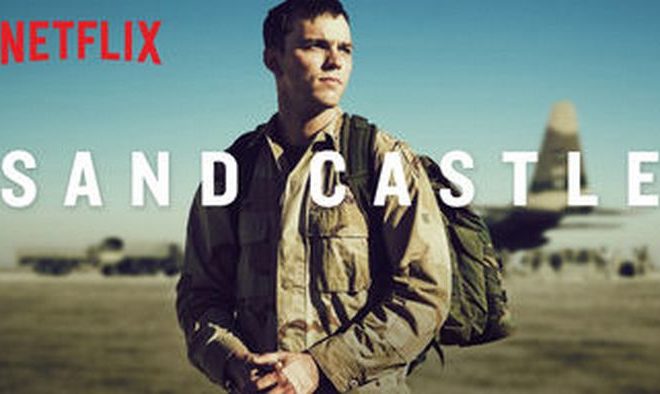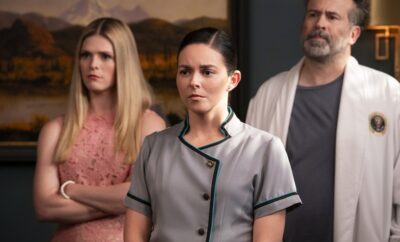
Interviews
Chris Roessner – Sand Castle
By: Jamie Steinberg
Q) Please tell us the premise for your film Sand Castle.
A) It’s basically about a platoon of soldiers who are dispatched a little village in Iraq to fix a water pumping station. They think it will be easy, but as a result of tension in the village and a lot of in fighting it becomes almost impossible.
Q) How close is this story to the real life events you experienced while serving in the military?
A) Most of the events are fictionalized, but things kind of radiate from the authenticity of my experience. The feeling of working very hard to solve a problem and then having minor success and then the next day having that success wiped away. That’s what is authentic. I was concerned most with ensuring that the American soldiers were written with as much nuance as possible and hilarious when they needed to be (because war can be hilarious sometimes). When people start dying, the audience feels a lot of pain because the audience has grown to love these characters. Also, it was important for me to write the Iraqi people with as much nuance as possible. And it was important for me to have Iraqi and the soldiers work together because that is crucial. In that regard, the characters are very, very authentic, but a lot of the events are somewhat fictionalized.
Q) Did you need to do any additional research in order to write the film?
A) Some of the more difficult moments to film where people are hurt or killed – I lifted a lot of that from my personal experience. But the weather pumping station is a fictional element of the film, but again it grows from a very authentic place which is the frustration someone feels when they work so hard to solve a problem and how success can be taken away from them so quickly.
Q) How involved were you with the casting of the movie?
A) I was involved early on with the main character, the casting of Matt Ocre (Nicholas Hoult). That was the one I cared about the most. Then, I was involved in the Chutsky (Glen Powell) and those roles because they were very important to me and those had to be very authentic. So, I had lots of opinions about what I was looking for in those roles, but ultimately it is not up to me to hire the actors. I write up a long synopsis of what I think is important for each character and then I deliver it to the other producers and casting directors. That way everyone’s thinking is on the same page, but ultimately it’s not up to me to do the hiring. I am very blessed and lucky that we got some great actors.
Q) Did you get to visit the set and/or provide any input during filming?
A) I was on set the entire time – three and a half months I think it was. My job, rightly so, was to take a bit of a back seat and sort of be there to handle any changes or be a part of any conversations where contact needed to be made if we ran out of time, ran out of money or if people had any ideas my job was to say, “Okay, that’s a good idea, but this is what it does to the rest of the story.” So, if that were a decision it was okay to make, I think up until filming, as the writer/Executive Producer I had much more of a leadership role and then when filming started it was kind of my job to be more of a backstop to make sure we didn’t go too far away from what is intended.
Q) Enzo, and the rest of his fellow soldiers, are stuck trying to balance what they feel is right and what they have been ordered do. How common is that for soldiers?
A) It’s a constant struggle. This movie is as much about that internal struggle for each of these struggles as the internal struggles – the inter-personal struggle between the soldiers as it is about fixing the water pumping station. The water pumping station is simply a physical manifestation of what is going on inside of each and every one of them. That constant push-pull as a soldier of what you think is right and what you are told to do – the questioning of whether or not you are being helpful or causing more harm – is there. And that’s a struggle. The movie is as much about that for the characters as it is about anything else.
Q) What made Netflix such a perfect home for Sand Castle?
A) Netflix has been fantastic! They have a reach of about ninety million subscribers and to make a film this personal you care most about as many people seeing it as possible. On April 21, when the movie posts online, ninety million have access to it. I care more about that than anything else. After seven years of hard work, I did that work not because I care about my own ego. I don’t care about that at all. I have something I want to say about the war experience that I know doesn’t exist in our culture. It’s not a part of our conversation. And I want to put it there. With ninety million I can put it there overnight.
Q) What do you hope viewers of the film take away from watching it?
A) Two things: First, it’s important that people see (to me) that American soldiers and Iraqi people need each other to be successful. It’s important for people to see that when an American soldier is hurt or killed it hurts the Iraqi people and vice versa. It hurts when you care about a translator or an Iraqi person that is helping you. It hurts very much and I think that I really want people to see that. I want everyone to experience that. Second of all, it is important that people see soldiers look as young as they are. The average age of a soldiers killed in Iraq I think is twenty or maybe twenty-two. It was important for me that this cast look that way – that they look that young. That matters to me. If people take those two things, I’ll be happy.





You must be logged in to post a comment Login